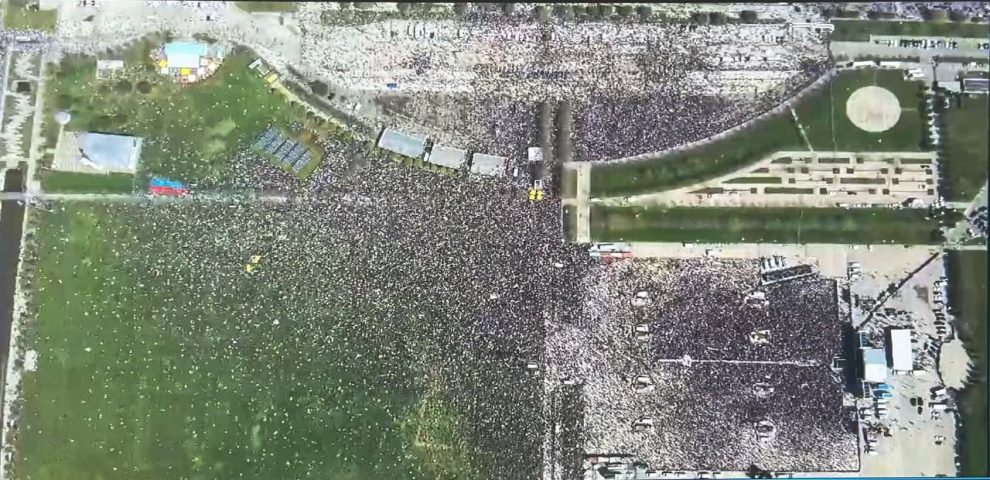The disappointing attendance at CHP’s Maltepe rally signals declining enthusiasm for Ekrem İmamoğlu and internal discontent within the party.
The Maltepe rally, organized to boost support for Istanbul Mayor Ekrem İmamoğlu, attracted significantly fewer participants than expected, reflecting a possible disconnect between the CHP leadership and its grassroots supporters. Issues such as internal divisions, dissatisfaction with policy direction, and lingering corruption allegations may have contributed to the low turnout. The decision to silence Muharrem İnce further exposed fractures within the party. With local elections on the horizon, the CHP must address these concerns to avoid potential electoral setbacks.
The Republican People’s Party (CHP) held a rally in Maltepe, Istanbul, to support Mayor Ekrem İmamoğlu ahead of the local elections. However, the turnout fell far short of expectations. While organizers anticipated a massive crowd, reports indicate that only around 200,000 people attended the event. Compared to past CHP rallies in Maltepe, this marked a significant decline, raising concerns about the party’s current standing with its base.
The rally was meant to be a major show of force, demonstrating party unity and enthusiasm for İmamoğlu’s re-election campaign. Instead, the underwhelming participation suggested that the CHP is grappling with internal tensions and a disconnect between its leadership and grassroots supporters.
Discontent Among the CHP Base: Are the Party’s Policies Failing to Resonate?
In recent months, the CHP has been experiencing internal divisions. Under new chairman Özgür Özel, the party has taken a different direction, but this shift has not been universally welcomed. Many longtime supporters have expressed discomfort with certain policy positions and strategic decisions. The lower-than-expected attendance at the Maltepe rally seems to reflect this dissatisfaction.
The CHP has been trying to appeal to conservative voters, but in doing so, it may have alienated part of its traditional social-democratic base. Some long-time supporters feel the party is drifting away from its core principles, leading to frustration and disengagement.
Analysts suggest that another factor behind the lackluster turnout could be the party’s handling of candidate selection for the upcoming elections. Discontent over nomination decisions and the perception that İmamoğlu is prioritizing personal ambitions over party interests may have discouraged some voters from participating in the rally.
Muharrem İnce Silenced: A Sign of Ongoing Divisions?
One of the most controversial moments of the rally was the decision to deny former CHP presidential candidate Muharrem İnce a chance to speak. İnce, who ran as the party’s nominee in the 2018 presidential elections and still holds significant influence among certain CHP voters, was reportedly not given an opportunity to address the crowd.
Despite having some supporters in attendance, İnce left the rally early after being denied a speaking slot. This incident highlighted lingering divisions within the party and suggested that past conflicts remain unresolved. The CHP leadership has been trying to project a message of unity, but sidelining figures like İnce could further alienate segments of the party’s base.
The refusal to let İnce speak could be seen as a continuation of past internal rifts. Many still remember how he broke away from the party to form the Memleket Party, after alleging that he had been marginalized within the CHP. The Maltepe rally’s handling of İnce suggests that these wounds have yet to heal.
Why Is Support for İmamoğlu Weakening?
Ekrem İmamoğlu rose to national prominence with his stunning 2019 mayoral victory, becoming one of the most popular figures within the CHP. However, the lower-than-expected attendance at the Maltepe rally has raised questions about his ability to mobilize the party’s base in the same way he did in previous elections.
While some argue that voter fatigue and shifting political dynamics are natural factors, others believe that dissatisfaction with İmamoğlu’s governance has played a role. Is the decline in support for İmamoğlu linked to allegations of corruption, bribery, and misconduct?
Over the past few years, various corruption allegations have been directed at the Istanbul Metropolitan Municipality. While İmamoğlu himself has denied any wrongdoing, such claims could have affected public perception. Has the CHP voter base begun to question whether İmamoğlu represents real change, or do they see him as just another politician entangled in the same issues that they have long criticized?
Additionally, within the party, there has been resistance to İmamoğlu’s growing influence. Some CHP factions reportedly view him as a future rival for national leadership, creating internal power struggles that may have dampened enthusiasm for his re-election campaign.
What’s Next for the CHP?
The Maltepe rally was supposed to energize the CHP base and showcase the party’s unity ahead of the local elections. Instead, the underwhelming turnout and internal conflicts have raised serious concerns.
If the CHP wants to maintain control of Istanbul and other key cities, it may need to reconnect with its core voters, address internal rifts, and rebuild trust. The leadership will likely need to reassess its strategy, particularly in terms of candidate selection and messaging.
The coming weeks will be crucial in determining whether the party can regain momentum or if the Maltepe rally was an early warning sign of deeper electoral challenges ahead.






